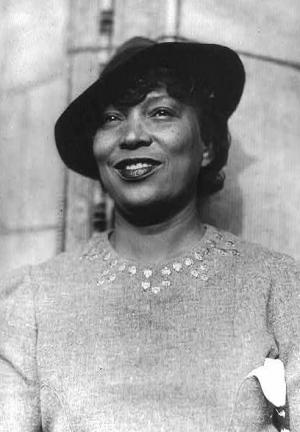The Legacy of Zora Neale Hurston

This lesson will examine Zora Neale Hurston’s lifelong commitment to African American literature and cultural preservation.
60 minutes.
Recognize the connection between cultural anthropology and the legacy of Zora Neale Hurston.
- The Legacy of Zora Neale Hurston Student Worksheet
- Internet Access
- Timer
Inquiry Arc/Compelling Question:
How did Zora Neale Hurston use anthropology and literature to preserve African American culture?
Warm Up:
THINK-PAIR-SHARE is a collaborative learning strategy where students work together to solve a problem or answer a question. This strategy requires students to (1) think individually about a topic or answer to a question; and (2) share ideas with classmates. Discussing with a partner maximizes participation, focuses attention and engages students.
- (THINK) Instruct students to research the term cultural anthropology, then summarize and explain the job of a cultural anthropologist *Set the timer for (5) minutes. Remind students to write in complete sentences
- (PAIR) Have students compare their summary with a partner. Afterwards, with the same partner, students should reflect on the question “Why is studying peoples’ beliefs, practices, social organization important to helping preserve culture?”*Allow roughly 30 seconds for students to select partners. Review the directions and then set a timer for 3 minutes.
- (SHARE) Give students 30 seconds to decide which partner will share-out with the group. *In the interest of time, only select about 4 students to share.
- (PREPARE) Transition students into the lesson by reading a short excerpt (whole class) and answering two short prompts (whole class)
Activity #1:
Text-dependent questions require students to return to the text to support their answers. This re-reading fosters deep thinking, the ultimate goal of text-dependent questions. This activity can be completed independently or in groups.
- Have students follow the process for text dependent questions to complete the short article about the life of Zora Neale Hurston
- Be sure to teach/re-teach the Text-Dependent Question process
- Read text dependent question
- Locate answer in the document (annotate, underline, highlight, circle)
- Restate the question in the answer
- Cite evidence or examples from the document
- Proof Read final answer
- Scaffold: Provide evidence sentence starters [For example: Based on this…,For example in the text it states…,In paragraph _ it argues…]
Teacher should….
- Briefly reteach & demonstrate the text dependent question process with Question #1 (ONLY)
- Review & model expectations for text dependent question responses
- Circulate and assist as needed
- Keep time (10 minutes)
Activity #2:
In a whole group, review the story behind the making of Zora Neale Hurston's book Barracoon.
- Have students reflect on its impact independently by responding to the reflection questions .
- Return to the whole group for discussion
- Each response should be at least two to three sentences
Teacher should….
- Review and read aloud the story, being sure to explain any unfamiliar words
- Select a student to read the reflection questions aloud before releasing students to independent work
- Circulate and assist as needed
- Keep time (3-4 minutes)
Assessment:
- Using the article Soulful Quotes by Zora Neale Hurston, have students create a visually appealing postcard connected to a quote that you find most significant
- Students selected quotes should be written on the lines provided, while the illustration should be placed in the blank space
- Remind students to think of what the quote means and/or represents to inform is drawn
Informed Action:
Have students display their postcards around the classroom or school to spread awareness about the life and legacy of Zora Neale Hurston
CCSS.ELA-LITERACY.RH.11-12.1 Cite specific textual evidence to support analysis of primary and secondary sources, connecting insights gained from specific details to an understanding of the text as a whole.
CCSS.ELA-LITERACY.RH.11-12.7 Integrate and evaluate multiple sources of information presented in diverse formats and media in order to address a question or solve a problem.
D2.His.5.9-12. Analyze how historical contexts shaped and continue to shape people’s perspectives.
C3 Anthropology Companion Document: Concept 2: College, Career, and Civic Ready Student: Develop an understanding of the methods by which anthropologists collect data on cultural patterns and processes, and of ways of interpreting and presenting these data in writing and other media.
